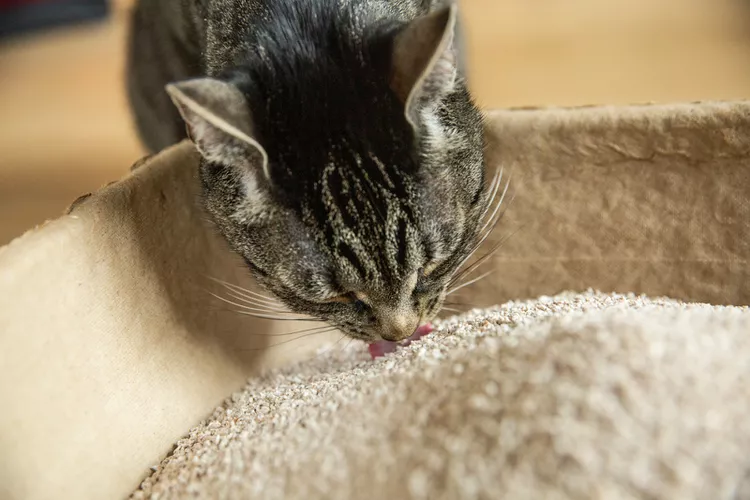Why Cats Eat Litter and How to Stop It

Cats may eat litter—and other undesirable materials—for a variety of reasons. This behavior is referred to as pica, the eating of non-food items.
Pica has a variety of causes and may stem from a mom abandoning her kittens, which can manifest itself in nursing behavior. Cats with pica can target all types of materials: plastic, fabric, string, paper, dirt, and even litter.
Some forms of pica may be relatively harmless or annoying—such as licking plastic bags—but eating non-food substances can cause intestinal blockages. Also, it can be a sign of an illness.
Why Do Cats Eat Litter?
If your cat or kitten is eating litter, it could be either a health or behavior issue. If you suspect it's a health issue, you should bring your cat to the veterinarian right away, especially if the behavior appears suddenly.
Some kittens may eat litter purely out of curiosity and will grow out of the behavior with close monitoring.
Anemia
Eating litter could be a sign that your cat is sick, and in particular, anemia is a condition where an affected cat could be exhibiting this sign. Anemia occurs when there is a lack of red blood cells and hemoglobin. Cat owners should check for gums that are pale, white, or bluish. Anemia can indicate a deficiency in iron, trace minerals, vitamins, or essential fatty acids.
Additionally, if your cat is anemic, the anemia could also be a sign of underlying feline leukemia virus (FeLV), kidney disease, bone marrow disease, or parasites.
Your veterinarian will perform a standard exam and will likely recommend blood work, including a complete blood count (CBC) and urinalysis. These diagnostics will confirm if the cat is anemic and help screen for underlying diseases.
Nutritional Deficiencies
Your cat could be eating litter if it's not getting sufficient nutrition from its food. This can occur if your cat is not eating a properly balanced diet, but it may also occur if your cat’s gastrointestinal tract is not effectively absorbing nutrients. Your veterinarian or a veterinary nutritionist can guide you on the appropriate steps to take if nutritional deficiency is suspected.
Curious Kittens
Kittens may eat litter out of curiosity, so it’s recommended not to use clumping litter until they are older. Ingesting clumping litter may cause an intestinal blockage. Be sure to use a non-toxic and environmentally friendly litter and monitor use. Remove your kitten from the litter box if you see it's eating the litter—just be sure your kitten has finished its business first.
Adult cats may also snack on litter if the type of litter has been changed recently, for instance, to a wheat- or corn-based litter.
How to Stop Your Cat From Eating Litter
Once your cat has received a clean bill of health, you can concentrate on redirecting his behavior from eating the litter. Of course, there are many types of litter: clay, clumping (scented and unscented), and those composed of corn, wheat, or paper. If your cat is eating one kind, try another.
- Your cat may be bored. If you see it eating litter, redirect the behavior with play. Toss a crinkle ball or toy mouse, or dangle a fishing pole toy and lure him away from the box.
- Reevaluate your cat's diet. Upgrade the food you're feeding, especially if it's supermarket-grade dry food. Many high-quality food options are more nutritionally complete.
- Enhance your cat's natural prey behavior. In addition to ramping up playtime, look into food puzzle toys, which encourage natural foraging behavior. There are many ways to make your own using common household items, as well as different models available in pet stores. Puzzle toys are fun ways for your cat to work to get its food, thus distracting it from undesirable behavior.
- Try offering a pot of cat grass. Again, this is a distraction from the litter and gives your cat something else to chew on. And don't forget that happy cat standby—catnip. You can grow your own and offer it fresh, sprinkle it on scratchers, or buy catnip-filled toys.